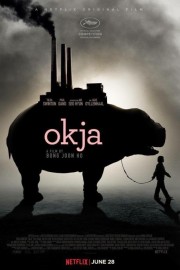Okja
I had forgotten that Joon-ho Bong had directed one of the very best films of 2014, “Snowpiercer,” until after I began watching “Okja”- I had just remembered having seen his monster film, “The Host,” a while back. Both films are important pieces of the cinematic DNA of his latest film, however- “The Host” for his desire to show us original creatures, “Snowpiercer” for its subversive social commentary in the face of a genre narrative. “Okja” is, quite possibly, my favorite film of the three, not necessarily because of the story he tells, but in the lovely, emotional way he tells it.
In the world of “Okja,” the world has come to distrust any foods containing GMOs, leaving the Mirando Corporation in a bind. To gain consumer trust, and build excitement, their CEO, Lucy Mirando (Tilda Swinton, in another comically-skilled dramatic performance) comes up with the idea of a contest. They will take 26 “super piglets” that the company has been breeding from their labs, and they will give them to farmers across the world. The farmers will grow them for 10 years, with Mirando and its top zoologist, Johnny Wilcox (Jake Gyllenhaal), tracking the progress, and after that 10 years, they will hold a celebration for the one they deem the “best super pig.” Our attention then turns to a farm in South Korea, where a grandfather, Heebong (Byun Hee-bong), has raised one of the contestants with his granddaughter, young Mija (Ahn Seo-hyun). Mija is 14-years-old, so she has know Okja, their super pig, since she was a child, and they have grown up together the way children grow up with pets. They are inseparable, and she cares deeply about Okja. They are visited by Wilcox, one day, and on first sight, Okja is declared the winner of the contest, but when the prospect of being separated from Okja arises, Mija is determined to get her back, and travels to Mirando’s warehouse in Seoul to get her, thrusting her into a larger narrative than she is even aware of- she just wants her beloved pet back.
During the time when Mija comes to Seoul to rescue Okja, the film takes on the structure of a “message movie” about animal cruelty, slaughterhouses, corporate greed and animal rights, but the driving force of Bong and Jon Ronson’s screenplay remains focused on Mija and Okja. We get glimpses of the terrible conditions animals in line to become food can be kept in, the efforts of animal rights activists (led by Paul Dano and Lily Collins) to expose the truth, and the lengths that both the ARA group and the corporation will go to exploit Mija for their own agendas. Through it all, our primary focus is on Mija and Okja. This is a socially-conscious “E.T.,” and that is not a knock on the film, because the bond between Mija (played by Seo-hyun in one of the year’s best performances) and Okja, a marvel of character creation, is so strong, and so well-defined at the outset of the film. Online reports of crying during the film, and especially at the end, are to be taken seriously, as Bong tugs at our heartstrings, not just because of what Mija is trying to save Okja from, but because we love the characters so much. Bong and his collaborators, not just his actors but the effects people who bring Okja to life, cinematographer Darius Khondji (“Seven”) and composer Jaeil Jung, are at the service of an emotional story, first, and they make it an unforgettable one.










